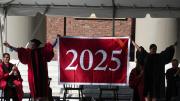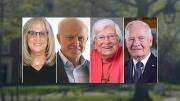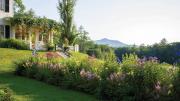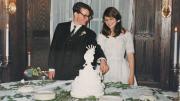Two College classes, together for the first time, celebrated their convocations on the same day, at separate outdoor events—one in the morning, the other in the afternoon—welcoming them to a fully re-opened Harvard. The Class of 2025 is larger than usual, and includes a number of students who deferred enrollment last year amid the pandemic; the Class of 2024 spent their freshman year attending classes remotely; two-thirds of them lived on campus, but in locked down conditions. As Tuesday’s ceremonies opened at Tercentenary Theatre, Dean of Students Katherine O’Dair proclaimed, “I have been waiting 12 months to say this: Welcome to campus!”
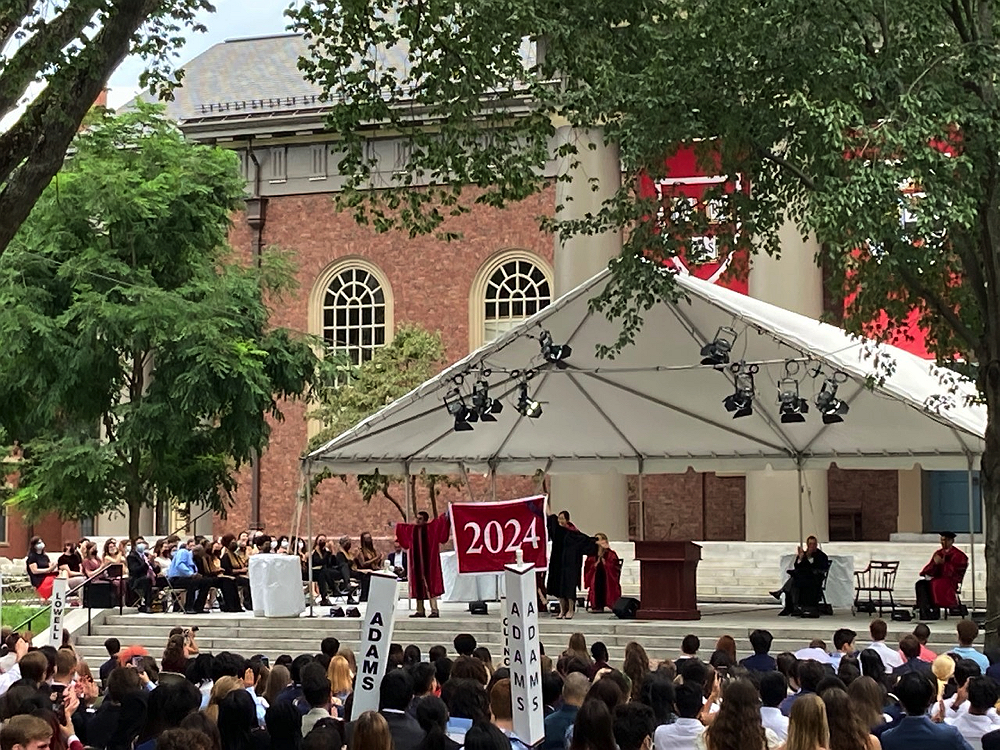
Convocation Class of 2024
Photograph by Lydialyle Gibson/Harvard Magazine
Amid the palpable joy in Tuesday morning’s convocation ceremony for the class of 2024, which included the elements that last year’s virtual event could not replicate—the Yard, the music, the marching, the in-person human presence of classmates cheering and laughing next to each other—there was also an unmistakable sense of a changed world. Speaker after speaker noted the uncertainty of the current moment and the renewed importance of interdependence and community-mindedness. Urging students to “show up” for each other and themselves, Dean O’Dair spoke of the “experiences, losses, and learnings” of sophomores who “arrive here as different people than you were a year ago.” To the students who have expressed a wish to “make up for lost time,” she admonished: there is no going back, not really. “There is no lost time; you all experienced the past year in ways that likely taught you lessons you may never have learned so early in life.” Dean of undergraduate education Amanda Claybaugh, who delivered the academic address, reflected on how to respond to complexity and change. “The independent mind holds its views a bit lightly, expecting those views to evolve, as we learn more about the world.” The professor of English was talking specifically about being a scholar, but also about how to go forward as a citizen and a thinker in a world altered by the upheavals of the pandemic.
President Lawrence S. Bacow sharpened the point about interdependence into literal terms, cautioning students—who spent their freshman year studying remotely or on a locked-down campus—to remember that although the campus vaccine requirement offers them new freedoms, “so many of the people you’re going to be encountering here, people who are going to be teaching you, coaching you, reshelving your library books, making your meals and cleaning your classrooms, … may in fact be returning home to young children whose freedom and opportunities are still limited by this pandemic. … Maintaining the ability to be together depends upon constant care for one another, especially as circumstances change.”
But Bacow also encouraged students to think about the ways the past year’s ordeals may have changed them, and can change them for the better. “What did you used to take for granted that now you see in a different light?” he asked. “What do you savor most about time in person, with your classmates, with your professors and mentors? Think about how you can shape the next three years to maximize those moments, because those are the moments that will be with you for a lifetime.” Expressing his elation at the students’ return to campus, he said that in the 52 years since he first arrived at a college campus as a freshman, “I’ve never been more excited to start an academic year.… Our time together is precious.”
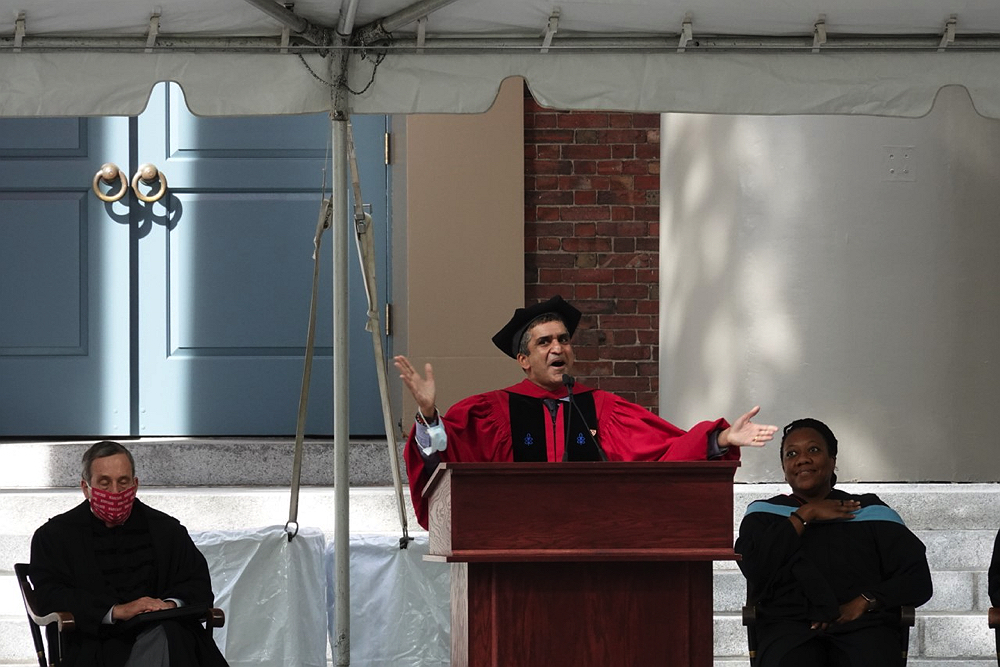
Rakesh Khurana
Photograph by Jonathan Shaw/Harvard Magazine
Danoff Dean of Harvard College Rakesh Khurana urged students to ask themselves similar elemental questions about new beginnings and new commitments, especially after the hardships and lessons of the past year-plus. “This will be the year that you declare your concentration,” he said. “But I’m also talking about something bigger than that, something more existential. What habits of mind do you want to commit to? What habits of heart? … What kind of person do you want to be, and what actions are you going to take to become that person?”
The answers to those questions, he acknowledged, may not be the same as they would have been a year ago. “After a year of living with so much uncertainty, it’s understandable that you may begin this year with anxiety and more uncertainty,” he said. “I know I am. … But I hope you will give yourself permission to live with that uncertainty for a while. Think about the commitments you will make this year as beginnings, not endings to the path you will travel over the next few years. And to commit does not mean to never change your mind; in fact, I think it means quite the opposite: to begin to know yourself and to remain open to who you might become.”
Then in the afternoon, the newly arrived first-year class of 2025 had a separate convocation ceremony. Students took dorm room photos outside their halls and processed to Widener Library, where they posed for a class photo in variations on semi-formal attire (one student was wearing a suit, cowboy hat, ski goggles, and cowboy boots). Then, they took their seats for new addresses from mostly the same speakers.
All the addresses touched on the theme that in this changed pandemic world, students must be more curious and more compassionate than ever. At a time when “our most deeply held values: truth, reason, civility, and inclusion are being challenged,” Dean Khurana said, the class of 2025 “faces some difficult choices about how you want to use your considerable talents and the opportunities available to you, in order to create a better world than the one that is being handed to you.” He acknowledged that, given the uncertain circumstances of this year, first-years might feel like “the only way forward is to actually hit rewind”—repeating the same strategies for success they used in high school. Khurana instead urged them to reconsider their definition of success entirely. “We hope that the college experience that you have is not about showing the world what you can do, but rather about discovering what needs to be done.”
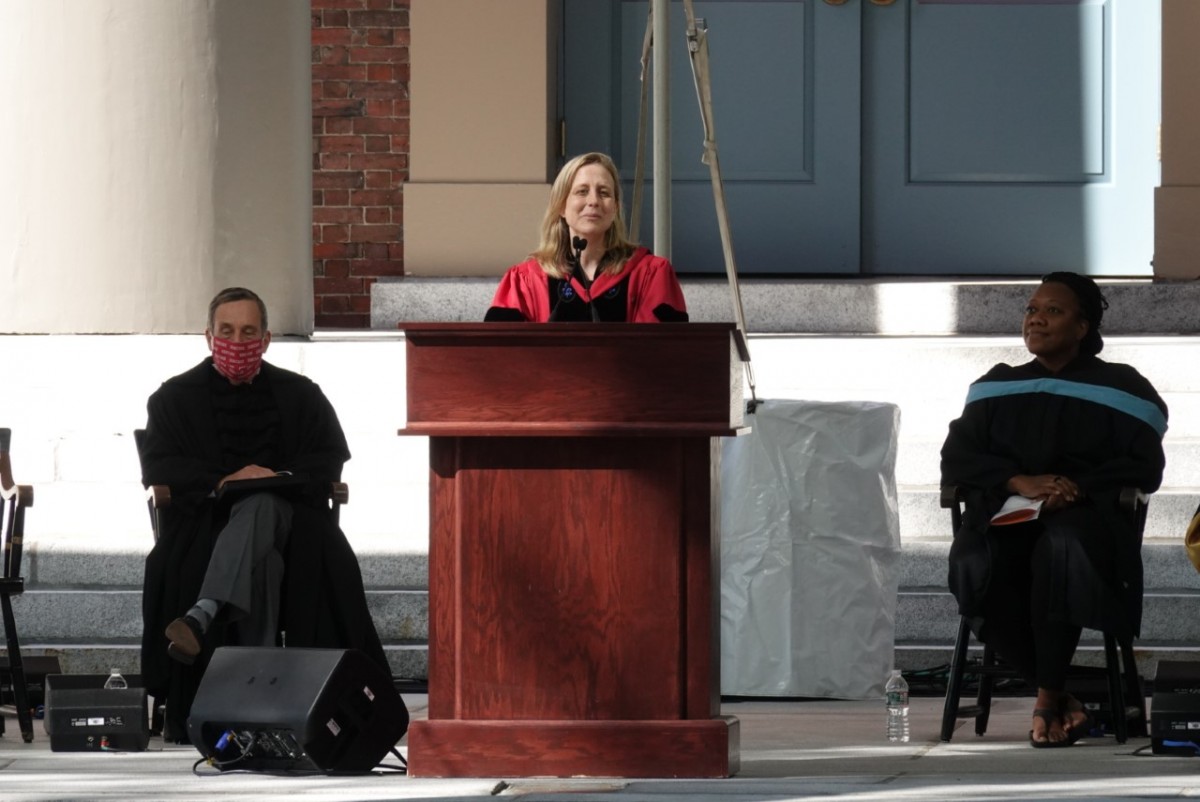
Amanda Claybaugh
Photograph by Jonathan Shaw/Harvard Magazine
Part of that discovery will hinge upon students developing an “independent mind,” as Claybaugh put it—an ever-evolving capability to hear other points of view and think deeply about the challenges of the world. For Khurana, this involves a great degree of humility. “Humility is not a word that many people associate with Harvard,” he says. “Let’s change that.” He urged students to take courses that might call into question their previously held beliefs and to “talk with those people whose experience challenges your way of thinking or what you think you know.” Trying to see the world from new perspectives will be difficult, he acknowledged. At one point in the ceremony, he asked students to clasp their hands and notice which thumb was on top. Then, he asked them to switch thumbs. “How does that feel? Strange, different?... This is not a challenge to your worldview or perspective…and yet, we can see how [the discomfort] already could inhibit us.”
Dean O’Dair similarly urged students to embrace discomfort—specifically, the discomfort of “newness,” which offers a “chance to redefine ourselves.” She described her own experience being new to Harvard five years ago. “I walked across the Yard and didn’t see any familiar faces. It was scary.” But by October, she said, “I found my footing. You will find your footing. So give yourself the grace not to rush that moment.”
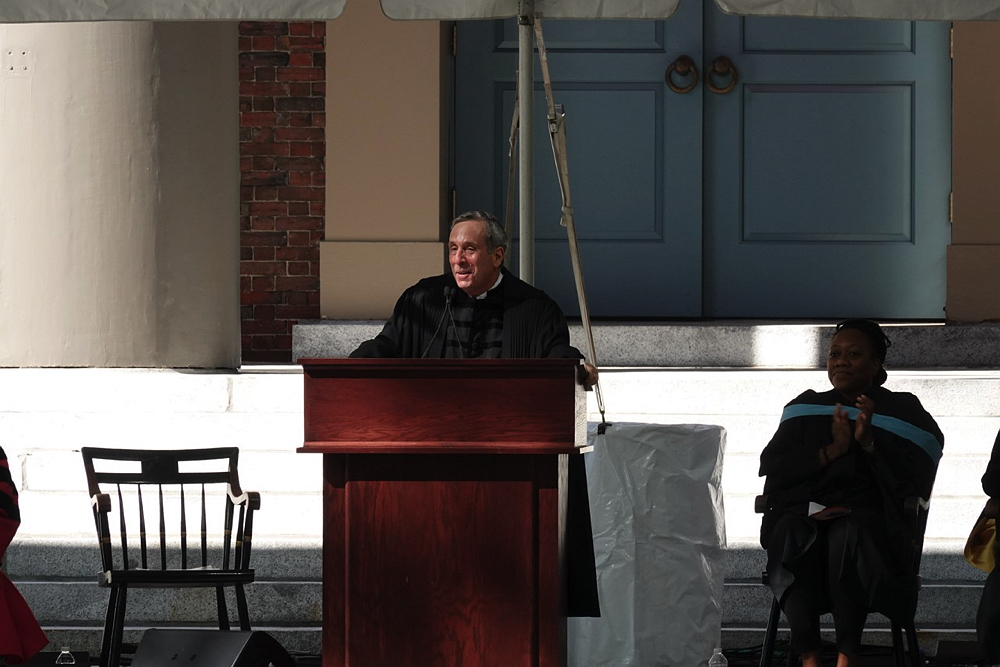
Lawrence S. Bacow
Photograph by Jonathan Shaw/Harvard Magazine
President Bacow (who asked the students to call him “Larry”) posed three questions from the Talmud: “Who is wise? Who is mighty? Who is wealthy?” The wise person “learns from all people,” according to the text. Bacow asked students to “prompt conversation rather than conflict” with their fellow students with opposing viewpoints.
The mighty person, on the other hand, “exercises self-control.” Here, Bacow’s message was practical, as it was in the class of 2024 address. “Vaccination does not equal invincibility… Being part of this community—this year in particular—means bearing special responsibility for the health and safety of others.”
The wealthy person “rejoices in his or her portion.” Bacow said, “There is nothing wrong with ambition, but ambition for ambition’s sake can be a distraction. Over the next four years, I hope you will devote luxurious amounts of time to understanding what truly satisfies you.” This “portion” is the “endeavor that swells your heart and fills you with a deep sense of satisfaction and wonder.” He said that “to rejoice in your portion, you must find your portion,” a journey which will involve students listening to themselves and not necessarily to the advice of their friends or family.
Finally, Bacow asked first-years to keep an open mind about the students around them. He recalled meeting one of his closest friends fifty years ago in a class in Emerson Hall. He told the class of 2025 that their future-close-friends “are here right now in this gathering. Your job is to go find them.” His parting words were, “Good luck and godspeed.”
